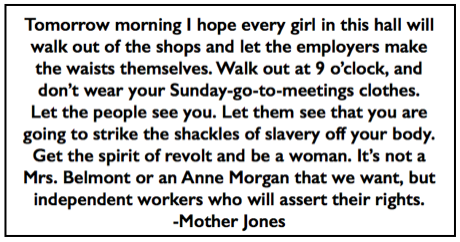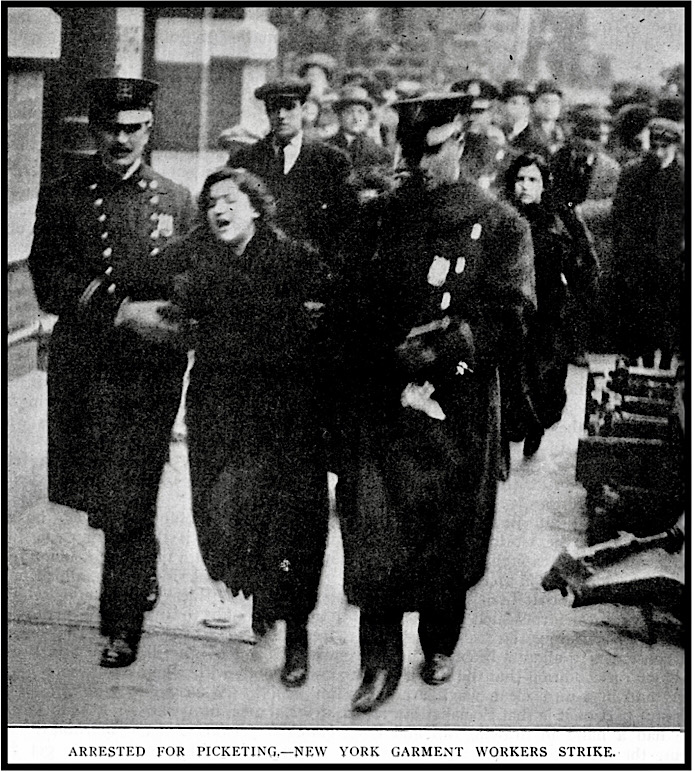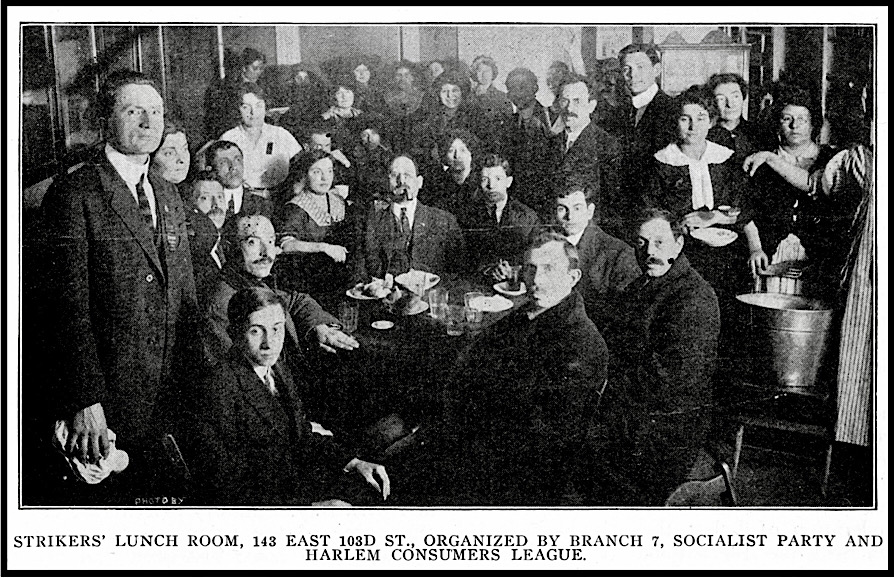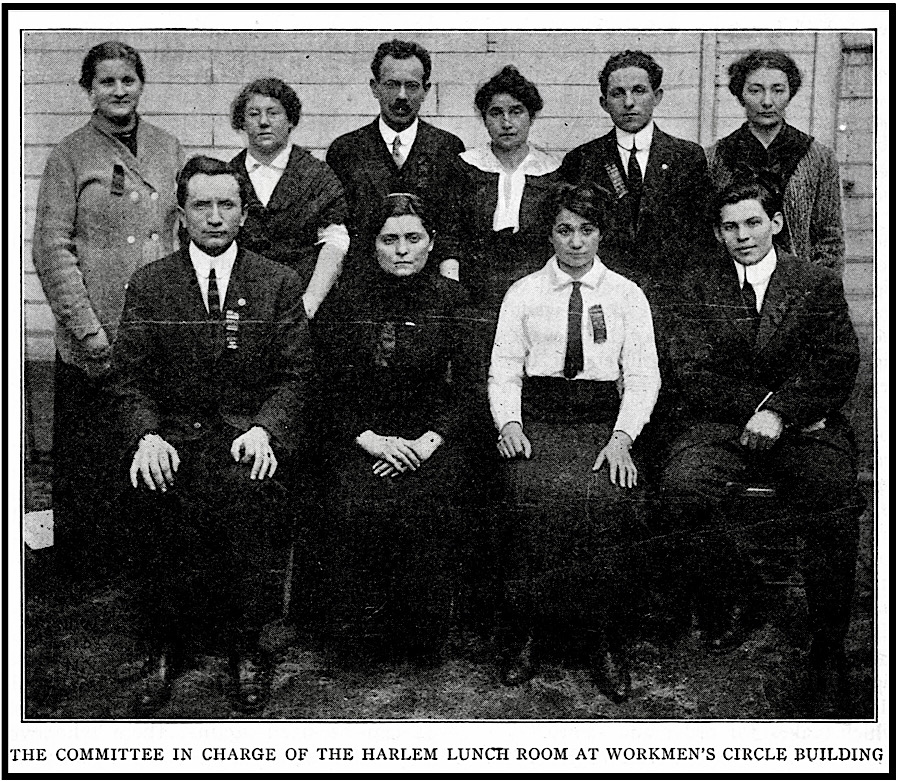 —————
—————
Hellraisers Journal – Monday March 3, 1913
New York, New York – The Striking Garment Workers and The Protocol
From the International Socialist Review of March 1913:
New York Garment Workers and the Protocol
-Phillips Russell
———-
The New Disease: Protocolic
As this is written, the great strike of the garment workers in New York is in its seventh week and, according to present indications, it may last even longer than the historic struggle of the cloakmakers in 1910, which endured for nine weeks.
At present the garment workers’ strike seems to be suffering from a bad attack of the new industrial ailment that might be described as the “protocolic.” Twice the officials of the United Garment Workers’ Union, who pulled the strike, have tried to get an agreement approved which involved the signing of a protocol, but both times got severe jolts from the strikers as a whole who made known their opinions of compromise in no uncertain tones. The attempt to induce the strikers to accept the protocol has so far produced little but dissension and has had much to do with smothering the spirit of the workers which at first was militant and aggressive.
The waist makers have already gone back to work under the terms of a protocol, though a considerable part of them did so reluctantly, and so great opposition was manifested towards it at one meeting in Cooper Union that a serious outbreak was narrowly averted.
A protocol is simply the old-fashioned contract or agreement in a new guise. It retains some of the most vicious features of the time-contract along with some modern trimmings hidden in a mass of legal verbiage. It is as full of treacheries as a bank of quicksand. It is, in brief, a document, agreed to and signed by both sides, which assures the capitalist of so many months or years of “industrial peace,” in which he can resume his grinding of the faces of the workers with a feeling that he is secure from strikes. By allowing their union officials or attorneys to fix up and sign a protocol, the workers enter into a contract with the capitalist system and agree to prolong it for a certain length of time on condition that their employers introduce certain reforms such as sanitation, abolition of sweating, etc. It is as if a man consented to allow a beast to suck his life blood on condition that the beast did it slowly and in a nice, clean way. And the shameful part of it is that Socialist lawyers have had a hand in drawing up and enforcing the provisions of these protocols.
The protocol promises to become the principal bar to revolutionary unionism in the garment-making industry of America. It absolutely prevents the workers from taking measures to remedy their own conditions by removing their affairs out of their own hands and putting them into the tricky claws of a court of arbitration.
Of course, not all employers are in favor of settling a strike by signing a protocol. The more obstinate ones fight it because in a sense it involves “recognition of the union,” and independent manufacturers are inclined to oppose it because it places the industry too much in the hands of the “big fellows.”
But that the protocol is essentially a capitalistic scheme is proved by the laudatory remarks of Julius Henry Cohen, attorney for the cloak manufacturers in the 1910 strike, in an interview printed in the New York Times, Sunday, Jan. 26.
Cohen says that intelligent capitalists are no longer fighting the trade unions and obstinately holding out for the “open shop,” because:
[The open shop is a shop] where Ettor, Giovannitti, Haywood and Rose Pastor Stokes, may come in at any time and raise trouble. In the preferential union shop the employer has something to say as to which union he will deal with, and if he selects the stronger and more rational union he precludes Mr. Ettor and Giovannitti. To that extent he truly runs a closed shop.
In other words, the rise of the L W. W. has taught the capitalist that the craft union is his principal bulwark in preserving and sustaining the system which makes wage-slavery possible.
Cohen goes on to show what a friend the craft union is of the capitalists in the following words:
Now, why should not sensible business men realize that if they want peace in an industry, it is not a question of union or no union? The real situation is, which union. Shall we do business with a union which is strong enough to make and maintain a treaty of peace, or shall we do business with a band of guerrillas who attack us at every point, with whom we cannot reason, and who, if we succeed in beating them in a strike, come into our shops and destroy both our product and our machines?
And, after all, what can we get from a group of people who regard us as enemies? Must we not create a proper factory atmosphere in order to turn out our work? And what good will it do us to take orders and buy goods if our machines are idle? We cannot by any power under the sun compel people to work against their will. Must we not realize, therefore, that sooner or later we must deal with the recognized representatives of the working people in whom they have confidence, and, having convinced them of the reasonableness of our side, secure a working arrangement that will include the discipline of those who violate it?
I believe that all that practical business men need to know is that the thing is really workable to wake up to its necessity. The necessity is here, sure enough. The hotel proprietors were warned four years ago that if they did not deal with the Amerindian Federation of Labor they would have to deal with the International Workers of the World. Now they have them. The mill owners of Lawrence refused to deal with John Golden of the textile workers, but when Ettor and Giovanitti arrived, they were only too glad to ask for John Golden’s help.
The great thing about this whole experiment which is being tried in the garment-making industry, is not merely that it brings peace and economic order to an industry; but that it is a method of education and discipline. That is why it is so vigorously opposed by the Industrial Workers of the World. They don’t want any individual restraint. They don’t want any discipline by executive officers of the order. They don’t even want any organization. But when a powerful union is held responsible for all of its members, the shop workers must obey orders, and there can be no uprising in the shop over such incidents as the discharge of a co-worker. Under protocol conditions, no grievance will be considered either by the union leaders or the Manufacturers’ Association until the men return to work. This kind of moral discipline is new for the working people in the needle workers’ industry. The discipline of the union whose officers the people themselves select, is the moral force which makes for order and sanity.
PHILLIPS RUSSELL.
[Emphasis added.]
~~~~~~~~~~~~~~~~~~~~~~~~~~
SOURCES & IMAGES
Quote Mother Jones to Philly Shirtwaist Makers Dec 19, NY Call Dec 21, 1909
https://www.marxists.org/history/usa/pubs/the-new-york-call/1909/091221-newyorkcall-v02n315-DAMAGED.pdf
International Socialist Review
(Chicago, Illinois)
-March 1913, pages 649-652
https://www.marxists.org/history/usa/pubs/isr/v13n09-mar-1913-ISR-riaz-ocr.pdf
See also:
Tag: NYC Waistmakers Uprising of 1909-1910
https://weneverforget.org/tag/nyc-waistmakers-uprising-of-1909-1910/
Tag: New York Garment Workers Strike of 1913
https://weneverforget.org/tag/new-york-garment-workers-strike-of-1913/
~~~~~~~~~~~~~~~~~~~~~~~~~
Working Girl Blues – Hazel Dickens & Alice Gerrard



